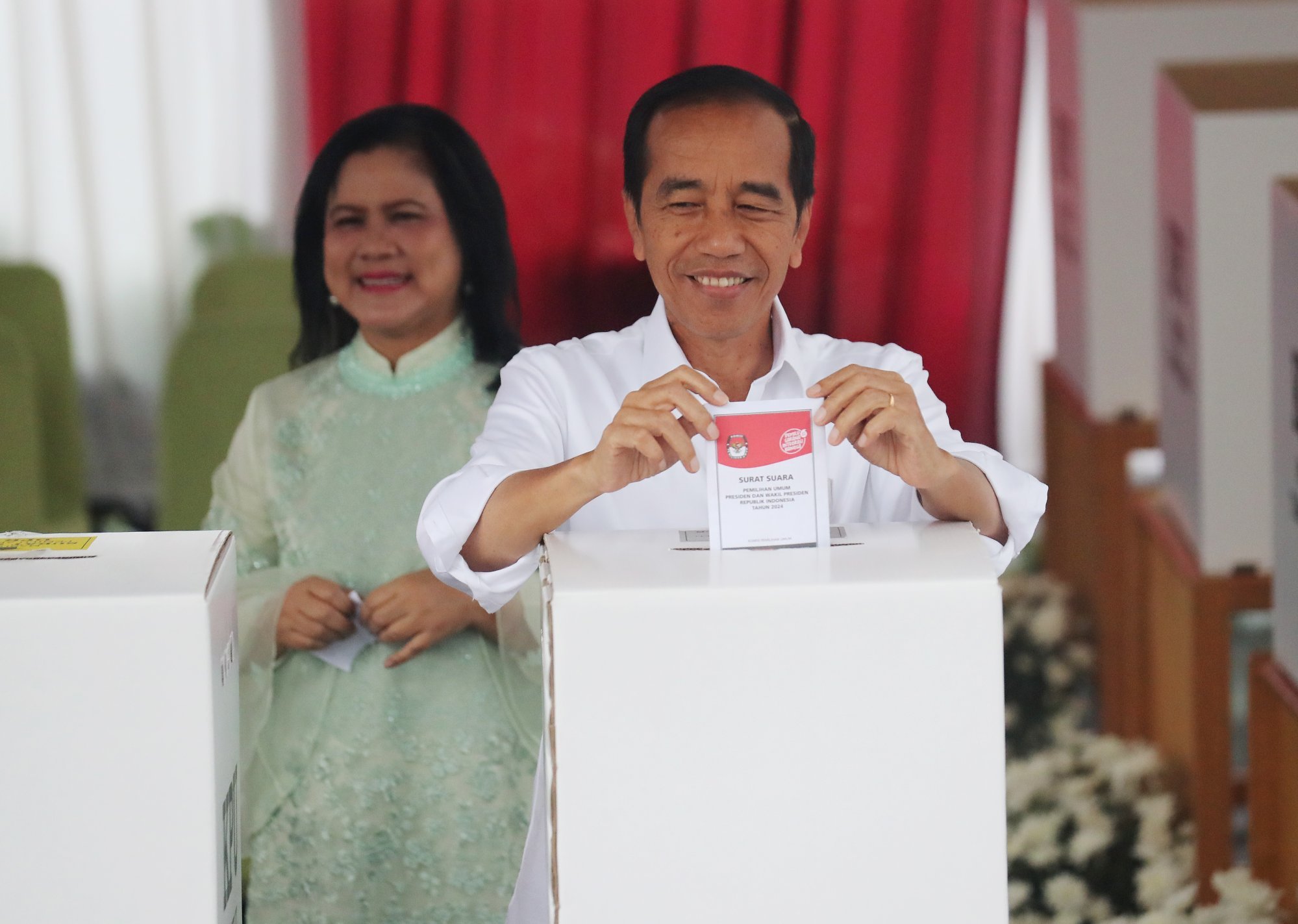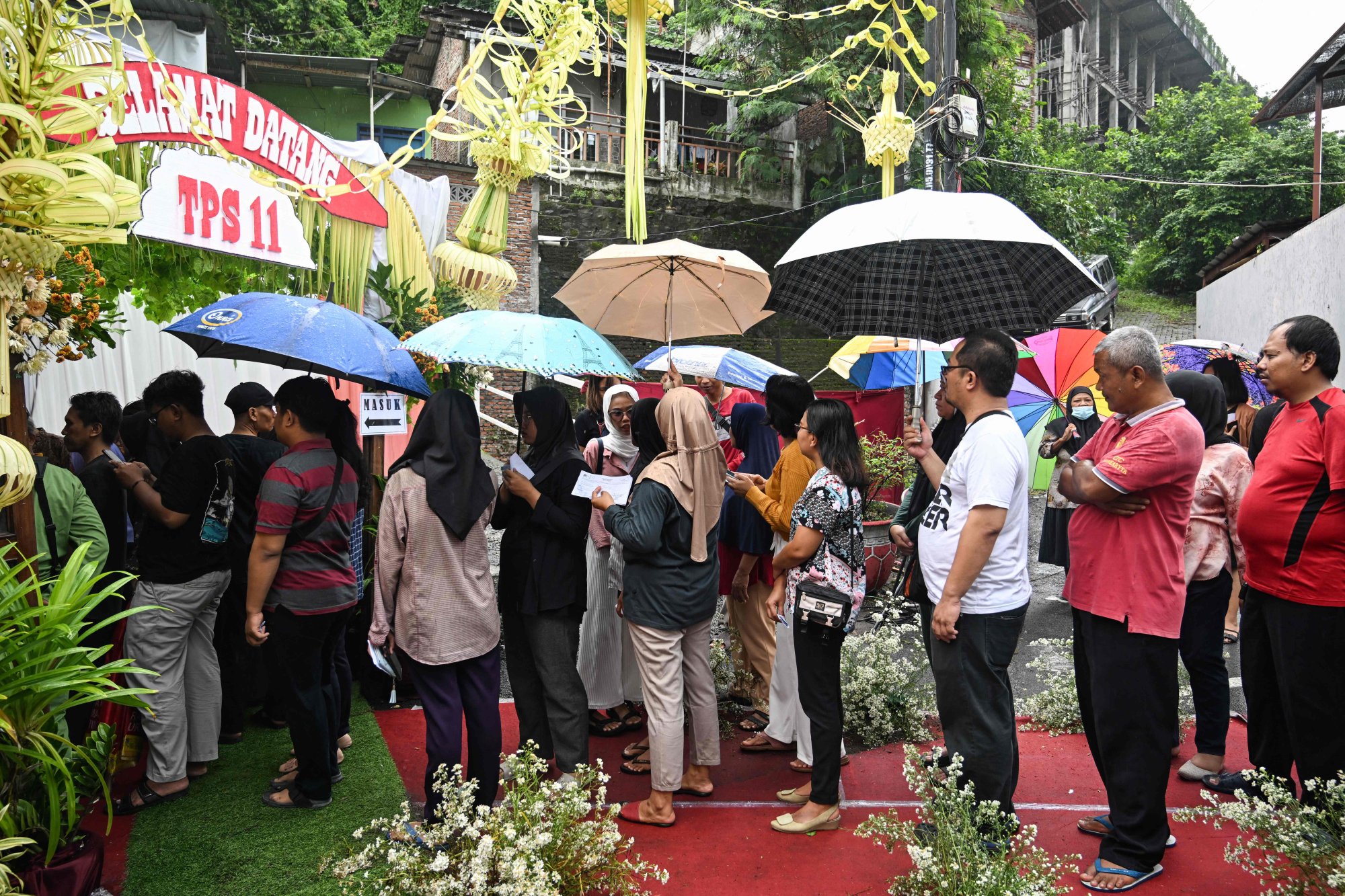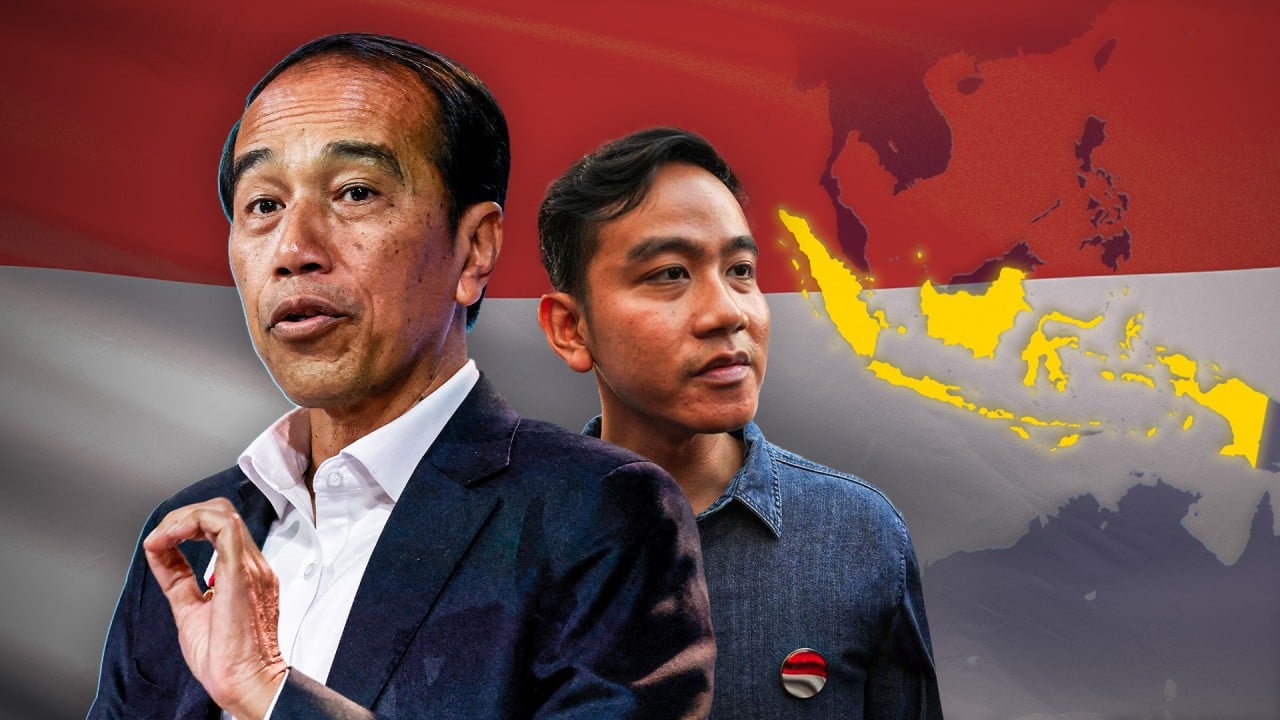
Indonesia election 2024: Prabowo Subianto hails ‘victory for all Indonesians’ as early counts show him in lead with 58%
- Prabowo’s camp says it is ‘confident’ the defence minister has earned a one-round victory over his rivals, Ganjar Pranowo and Anies Baswedan
- This is Prabowo’s third bid for the top job, and he’ll take over the presidency from rival-turned-ally Joko Widodo, to whom he lost the last two polls
Defence Minister Prabowo, 72, received around 58 per cent of the vote, according to quick counts by several pollsters, beating former Jakarta governor and opposition candidate Anies Baswedan, as well as former Central Java governor Ganjar Pranowo, who was running on the ruling party’s ticket.
“We are confident this is a single-round victory for Prabowo and Gibran,” said Prabowo’s party’s secretary general, Ahmad Muzani, referring to his running mate.
Official results might take weeks to confirm, but the “quick count” method, in which independent pollsters and volunteers tally ballots from a sample of voting stations, has proved to be a reliable indicator of the final results in previous elections.
Speaking at an indoor stadium in Jakarta, Prabowo hailed the “smooth and successful” election that showed he and Gibran had won in one round.
He said his team “should not be arrogant” and “euphoric”, and that the outcome was “a victory for all Indonesian people”.
“We will assemble a government team consisting of the best sons and daughters of the Indonesian nation. We still need the official results of the General Election Commission. We believe that Indonesian democracy is running well,” he added.
Jokowi’s son summoned by Indonesian election watchdog for handing out free milk
“Now that the campaign is over, we are reunited. I invite you to forget harsh words. Fighting is normal, as long as it doesn’t become divisive. The people want harmony between their leaders.”
Despite Prabowo’s declaration of a first-round victory, Ganjar and Anies’ teams insisted the fight was not over.
Tom Lembong, vice-chairman of Anies’ campaign team, said they “remain confident” that Anies would make it to the second round and urged Indonesians to wait for the official count.
Arsjad Rasjid, a member of Ganjar’s campaign team, told supporters “not to be sad” as the votes were still being counted.
Jokowi under renewed fire for saying presidents ‘can take sides’ in election
While Prabowo led opinion surveys over the past few months, it was unclear previously whether he would be able to obtain a simple majority of more than 50 per cent of the vote in Wednesday’s election needed to avoid a second-round run-off poll.
Widodo, who is constitutionally barred from a third term, will hand over the role to Prabowo in October. The president, popularly known as Jokowi, has been relatively well-liked throughout his 10 years in office, with the latest survey showing his approval rating at over 70 per cent in December.
But analysts say his all but official endorsement of Prabowo has left a bad taste in the mouths of some voters, who perceive his lack of neutrality as undemocratic.
There have already been protests by students and pro-democracy activists across the country denouncing Widodo and Prabowo, and analyst Alexander R. Arifianto says more demonstrations should be expected in the aftermath of Prabowo’s victory.

“It is likely that we might see some pushback from students and people who are unhappy with Prabowo’s win,” said Arifianto, a senior fellow with the Indonesia Programme at the S. Rajaratnam School of International Studies in Singapore.
“There is already discontentment with how this election has played out,” he added, pointing to controversies surrounding Gibran’s nomination, as well as allegations that state officials used government welfare resources to sway support for Prabowo.
Widodo has also been able to swiftly pass laws after forming a broad ruling coalition in his second term, providing him with little opposition in parliament.
Analysts say there is likely to be more political movement from Widodo in the next few months.
“I see Jokowi wants to cement his legacy. He wants to ensure that he has a good set of policies being enacted that’s going to be continued by his successor,” Arifianto said.
Prabowo slams West’s ‘unfair’ treatment of Indonesia: ‘we don’t need Europe’
But Prabowo might face challenges in pushing legislation when he takes over the mantle.
“Indonesia has had a big party coalition supporting Jokowi, and that might not be the case with Prabowo’s administration, given the strong public opposition towards Prabowo, as well as criticism of Gibran’s nomination,” said Noory Okthariza, a political researcher with the Centre for Strategic and International Studies (CSIS) in Indonesia.
“The parties who lose in this election might think twice about switching support from Anies or Ganjar and backing Prabowo … so there may be a more robust opposition group in parliament,” he added.
Prabowo’s possible agenda
Prabowo has not given any hints as to whom he might appoint into his cabinet.
“There is still so much secrecy and so much we do not know about Prabowo’s core team, including who will advise him on economic policy, foreign policy, defence, security and so on,” Arifianto said.
“Indonesia is still facing the basic problems of a developing country, so issues such as education, health infrastructure, poverty, jobs creation and eradicating corruption will still be the main focus, whoever the president is,” Noory said.
Prabowo warns of foreign meddling on Indonesian election campaign’s final day
But he added that some patterns, including the personalisation of power, and restrictions on media freedom and dissent, might be expected under Prabowo’s rule.
“Given his militaristic background, his rhetoric, his populist tendencies, it’s going to be very uncertain what kind of leader he will be,” Noory said.
Last November, when Prabowo was asked about his views on Indonesia’s foreign policy during a talk hosted by think tank CSIS, he called for a “rebalancing”, whereby the nation should “learn from countries in the East, such as Japan, [South] Korea, China and India” on how to eradicate corruption, improve education, foster a strong work discipline and display national pride.
“[Global South leaders] say the West has double standards. The West teaches us democracy, human rights … but the West has different standards”, Prabowo said. “There’s a shift in the world. Now we don’t really need Europe any more.”

Continuing Jokowi’s legacy?
While Prabowo has staked his campaign on the tacit support of Widodo, whether he will indeed maintain the current president’s policies remains to be seen.
This includes continuing Widodo’s ambitious US$32 billion project to build a new capital, Nusantara, in East Kalimantan, as well as his so-called downstreaming policy on nickel, which has been highly dependent on Chinese investment.
Observers say this promise of continuity is a big reason for the support behind Prabowo.
Jakarta resident Lia, 30, who voted for Prabowo, told This Week in Asia she did so “because he promises to continue Jokowi’s programmes”.
![Jakarta resident Lia, 30, left, says she voted for Prabowo Subianto because “he promises to continue [President] Jokowi’s programmes”. Photo: Resty Woro Yuniar](https://cdn.i-scmp.com/sites/default/files/d8/images/canvas/2024/02/14/800fc2ef-e4bf-43ac-bae7-ef28a991c186_dff549cb.jpg)
But analyst Arifianto said this was still uncertain. “Yes, he might be paying a lot of homage to Jokowi right now. But I’m inclined to think he would want to go on his own path,” he said.
As a former military general, and someone who in his tenure as defence minister has aimed to significantly increase Indonesia’s defence capabilities, Prabowo appears to want to see an Indonesia that is “powerful economically and also militarily”.
“I think he wants Indonesia to be a major regional power or a great power, if he has his way. So I can see him throwing state resources to make this dream happen,” Arifianto added.
Additional reporting by Reuters



